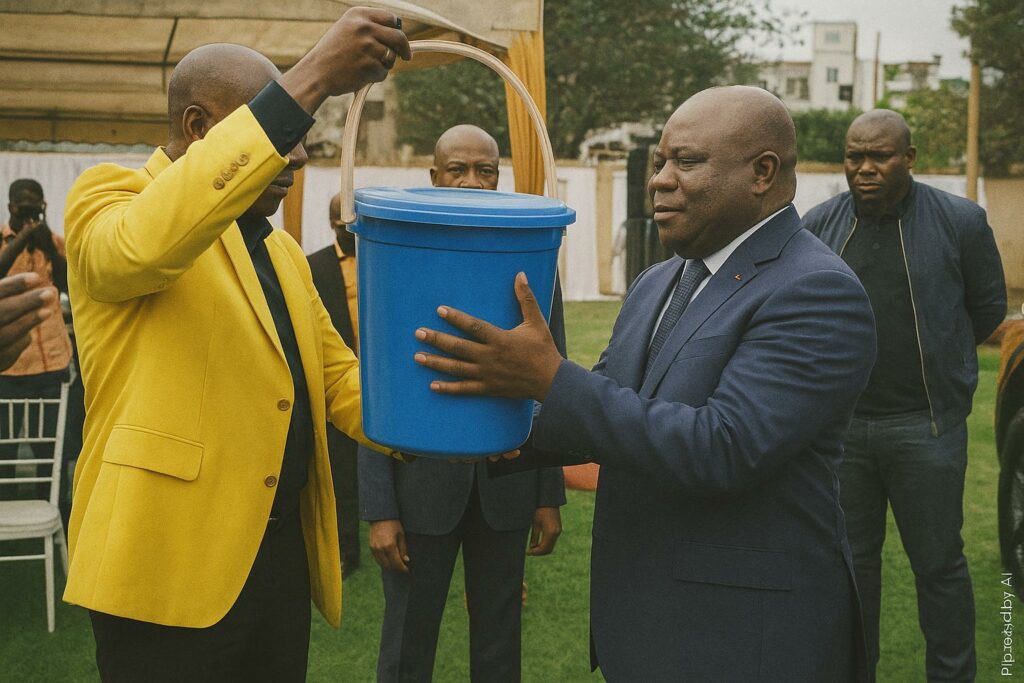Early Thunder of Support in Talangaï
The esplanade of Talangaï’s city hall, normally a quiet administrative enclave, reverberated last week with chants favouring a renewed mandate for President Denis Sassou Nguesso. The Association for the Development of the Liboka Axis (ADAL) gathered representatives from more than sixty villages to request, in unambiguous terms, that the head of state file his candidacy for the March 2026 election. Its chairman, engineer-turned-political-organiser Maixent Raoul Ominga, coupled the appeal with a symbolic public fund-raising drive that reportedly collected several million CFA francs in a matter of hours (Agence Congolaise d’Information).
A Crescendo of Civic Endorsements
ADAL’s move is scarcely isolated. Since the start of the year, the Patriotic Youth of Likouala, the Women’s League for Development in Pointe-Noire and the Confederation of Inland Traders have issued communiqués urging the incumbent not to ‘abandon the ship in mid-voyage’ (Les Dépêches de Brazzaville). Observers in Brazzaville’s diplomatic quarter note that these endorsements follow a carefully staggered calendar, each statement reinforcing the perception that a cross-section of society favours continuity. While critics question the spontaneity of such choreography, the government regards it as proof of a widespread aspiration to preserve the post-conflict equilibrium established after 1997.
Constitutional Mechanics and Political Memory
The 2015 constitution, adopted by referendum, reset presidential term counts and shifted the mandate to five years, thereby making Sassou Nguesso eligible for another bid. Veterans of the 2021 campaign recall that the incumbent secured 88 percent of the vote on a platform centred on peace and ‘la marche vers le développement’. International observers from the African Union characterised that ballot as ‘generally calm’, while urging broader civic space (African Union electoral report). By invoking that precedent, ADAL presents the 2026 contest less as a confrontation than as an administrative endorsement of a political trajectory already charted.
Stability Narrative and Regional Diplomacy
Supporters routinely cite Congo’s role in mediating crises from the Central African Republic to Sudan as evidence of the president’s diplomatic gravitas. In multilateral arenas—most recently the 2023 Paris Summit for a New Global Financing Pact—Sassou Nguesso portrayed Brazzaville as a ‘corridor of dialogue’ in Central Africa. For domestic audiences, such exposure feeds a narrative that Congo’s external stature derives from consistent leadership. Foreign envoys posted on the banks of the Congo River privately concede that, in a neighbourhood prone to abrupt transitions, continuity in Brazzaville offers a certain predictability important for energy investors and security planners alike.
Economic Recovery as Political Argument
ADAL’s communiqué underscores GDP growth rebounding to 4.0 percent in 2023 after a prolonged oil-price slump, a trend corroborated by the IMF’s most recent Article IV consultation. The Fund attributes the upturn to fiscal consolidation and the re-phasing of infrastructure projects. Pro-government economists add that ongoing negotiations with China’s Exim Bank on debt reprofiling could unlock fresh liquidity for the agricultural diversification programme. In this framing, a leadership change might unsettle negotiations that hinge on the personal rapport the president has cultivated with Beijing and with multilateral creditors.
Opposition Posture and International Optics
Official rhetoric insists that the political field remains open, yet opposition coalitions such as the Pan-African Union for Social Democracy have not agreed on a unifying candidate. Their spokespeople complain of administrative hurdles, even as they acknowledge that public rallies have resumed without major incidents since the lifting of pandemic restrictions. Western chancelleries are cautiously optimistic, citing the government’s invitation to the European Union to deploy an exploratory electoral mission. The extent to which that gesture will translate into substantive observation remains a pivotal question for partners who seek both democratic assurances and strategic continuity.
Strategic Timing of the Fund-Raising Drive
Analysts view the early launch of a popular subscription as an exercise in political signalling rather than a necessity for a well-resourced incumbent. By inviting small contributions—some as modest as 2 000 CFA francs—organisers seek to blur the line between state machinery and civic enthusiasm, projecting an image of a candidacy that arises ‘from the people’. In the process, potential dissenters are challenged to match, with equivalent grassroots fervour, a financial demonstration that is being documented in real time across local radio and social media.
Beyond March 2026: Continuity or Consolidation?
With barely seven months remaining, the stagecraft of endorsements and micro-fund-raising illustrates how the ruling coalition intends to narrate the forthcoming election: a plebiscite on stability, economic recovery and regional statesmanship. Barring an unforeseen realignment of opposition forces, diplomatic observers expect the incumbent to formalise his candidacy before the close of the fourth quarter, thereby allowing ample time for a campaign likely to highlight peace dividends and climate-forest diplomacy. For foreign partners, the value proposition is clear: a familiar interlocutor in a region where constancy is at a premium.

